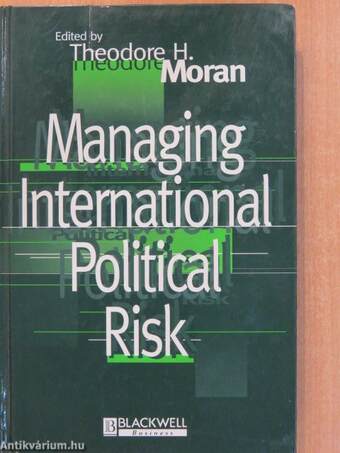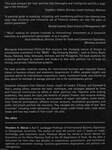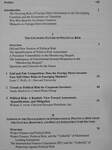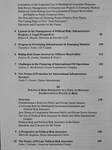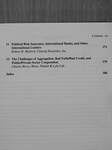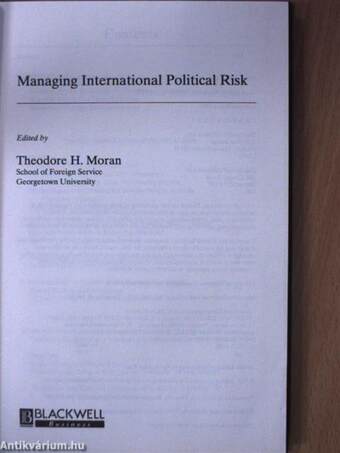1.066.319
kiadvánnyal nyújtjuk Magyarország legnagyobb antikvár könyv-kínálatát

VISSZA
A TETEJÉRE
JAVASLATOKÉszre-
vételek
Managing International Political Risk (dedikált példány)
| Kiadó: | Blackwell Publishers |
|---|---|
| Kiadás helye: | Oxford |
| Kiadás éve: | |
| Kötés típusa: | Fűzött kemény papírkötés |
| Oldalszám: | 193 oldal |
| Sorozatcím: | Blackwell Business |
| Kötetszám: | |
| Nyelv: | Angol |
| Méret: | 23 cm x 16 cm |
| ISBN: | 0-631-20880-1 |
| Megjegyzés: | Theodore H. Moran szerkesztő által dedikált példány. Fekete-fehér ábrákkal. |
naponta értesítjük a beérkező friss
kiadványokról
naponta értesítjük a beérkező friss
kiadványokról
Fülszöveg
"This book analyzes the 'new' political risks thoroughly and intelligently and fills a large gap in the literature." StephenJ. Kobrin, Director, Lauder Institute, Wharton "A practical guide to assessing, mitigating, and transferring political risks showing how növel deal structures and innovative use of financial markets can take the place of explicit guarantees." Donald Lessard, Sloan School of Management, MIT " 'Must' reading for anyone involved in international investment as a corporate executive, as a government policymaker, or as a student." Géza Feketekuty, Director, Center for Trade and Commereial Diplomacy, Monterey Institute Managing International Political Risk analyzes the changing nature of threats to international investment in the "BEMs" - Big Emerging Markets - such as China, Brazil, Russia, Pakistan, India, Venezuela, Vietnam, and the Philippines. The book examines the strategies developed by investors and lenders to deal with political risk in large oil, mining, and... TovábbFülszöveg
"This book analyzes the 'new' political risks thoroughly and intelligently and fills a large gap in the literature." StephenJ. Kobrin, Director, Lauder Institute, Wharton "A practical guide to assessing, mitigating, and transferring political risks showing how növel deal structures and innovative use of financial markets can take the place of explicit guarantees." Donald Lessard, Sloan School of Management, MIT " 'Must' reading for anyone involved in international investment as a corporate executive, as a government policymaker, or as a student." Géza Feketekuty, Director, Center for Trade and Commereial Diplomacy, Monterey Institute Managing International Political Risk analyzes the changing nature of threats to international investment in the "BEMs" - Big Emerging Markets - such as China, Brazil, Russia, Pakistan, India, Venezuela, Vietnam, and the Philippines. The book examines the strategies developed by investors and lenders to deal with political risk in large oil, mining, and priváté infastructure projects. The book provides essential reading for international business and corporate fináncé classes in business schools and economics departments. It offers valuable insights and practical advice for international corporations, banks, investment funds, and insurers as they search for methods to manage political risk in the contemporary period. Corporate strategists from Chevron, Exxon, Lloyd's of London, Citicorp, and Standard Et Poor's, among others, examine the tools, techniques, and strategies adopted by firms and financial institutions to offset or deter political risk. Together with leading academics, they assess the costs and benefits of project fináncé, non-recourse lending, aiternative syndication structures, securitization of export receivables, buliét bonds, local financial participation, offshore escrow accounts, multilateral guarantees, and public and priváté political risk insurance. They navigate the cutting edge of new "deal structures" including credit derivatives, default swaps, credit-linked notes, totál return swaps, and two-way trades of "bite-sized" risk units. The editor Theodore H. Moran is Kari F. Landegger Professor of International Business Diplomacy at Georgetown University. The author of somé 60 articles and 11 books on trade, technology, and investment issues, Professor Moran has served as Senior Advisor for Economics on the Policy Planning Staff at the US Department of State. He has been a consultant for more than two decades to corporations, governments, and multilateral agencies on investment strategy, business-government negotiations, and political risk management. VisszaTémakörök
- Közgazdaságtan > Menedzserképzés, marketing
- Közgazdaságtan > Gazdaságpolitika
- Közgazdaságtan > Pénzügy > Egyéb
- Idegennyelv > Idegennyelvű könyvek > Angol > Közgazdaságtan > Menedzserképzés, marketing
- Idegennyelv > Idegennyelvű könyvek > Angol > Közgazdaságtan > Gazdaságpolitika
- Idegennyelv > Idegennyelvű könyvek > Angol > Közgazdaságtan > Pénzügy > Egyéb
- Dedikált, aláírt kiadványok > Idegennyelv > Szerkesztő által > Dedikált kötetek
- Dedikált, aláírt kiadványok > Közgazdaságtan > Szerkesztő által > Dedikált kötetek
- Idegennyelv > Dedikált, aláírt kötetek > Szerkesztő által > Dedikált kötetek
- Közgazdaságtan > Dedikált, aláírt kötetek > Szerkesztő által > Dedikált kötetek



